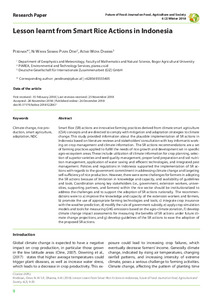Aufsatz

Lesson learnt from Smart Rice Actions in Indonesia
Zusammenfassung
Smart Rice (SR) actions are innovative farming practices derived from climate smart agriculture (CSA) concepts and are directed to comply with mitigation and adaptation strategies to climate change. This study provided information about the plausible implementation of SR actions in Indonesia based on literature reviews and stakeholders’ consultation with key informants work- ing on crop management and climate information. The SR actions recommendations are a set of farming practices applied to fulfill the needs of rice growth and development set in specific agro-ecosystem areas. These include utilization of climate information for crop planning, selec- tion of superior varieties and seed quality management, proper land preparation and soil nutri- tion management, application of water saving and efficient technologies, and integrated pest management. Policies and regulations in Indonesia supported the implementation of SR ac- tions with regards to the government commitment in addressing climate change and targeting self-sufficiency of rice production. However, there were some challenges for farmers in adopting the SR actions because of limitation in knowledge and capacity, and availability of guidelines and tools. Coordination among key stakeholders (i.e., government, extension workers, univer- sities, supporting partners, and farmers) within the rice sector should be institutionalized to address the challenges and to support the adoption of SR actions nationally. The recommen- dations were to a) improve the knowledge and capacity of the extension workers and farmers, b) promote the use of appropriate farming technologies and tools, c) integrate crop insurance with the weather prediction, d) modify the rule of government subsidy, e) apply crop simulation models and tools for measuring GHG emissions based on the agro-climate zonation, f) develop climate change impact assessments for measuring the benefits of SR actions under future cli- mate change projections, and g) develop guidelines of the SR actions to ease the adoption of the proposed SR actions.
Zitierform
In: Future of Food: Journal on Food, Agriculture and Society Vol. 6 / No. 2 (2018-12-26) , S. 9-20 ; 2197-411XSammlung(en)
Vol 06, No 2 (2018) (Future of Food: Journal on Food, Agriculture & Society // The Future of Food Journal: Journal on Food, Agriculture & Society)Zitieren
@article{doi:10.17170/kobra-2018122067,
author={Perdinan, Perdinan and Dewi, Ni Wayan Srimani Puspa and Dharma, Astari Widya},
title={Lesson learnt from Smart Rice Actions in Indonesia},
journal={Future of Food: Journal on Food, Agriculture and Society},
year={2018}
}
0500 Oax 0501 Text $btxt$2rdacontent 0502 Computermedien $bc$2rdacarrier 1100 2018$n2018 1500 1/eng 2050 ##0##http://hdl.handle.net/123456789/11032 3000 Perdinan, Perdinan 3010 Dewi, Ni Wayan Srimani Puspa 3010 Dharma, Astari Widya 4000 Lesson learnt from Smart Rice Actions in Indonesia / Perdinan, Perdinan 4030 4060 Online-Ressource 4085 ##0##=u http://nbn-resolving.de/http://hdl.handle.net/123456789/11032=x R 4204 \$dAufsatz 4170 7136 ##0##http://hdl.handle.net/123456789/11032
<resource xsi:schemaLocation="http://datacite.org/schema/kernel-2.2 http://schema.datacite.org/meta/kernel-2.2/metadata.xsd"> 2019-01-22T10:09:22Z 2019-01-22T10:09:22Z 2018-12-26 doi:10.17170/kobra-2018122067 http://hdl.handle.net/123456789/11032 eng Section Specialized Partnerships in Sustainable Food Systems and Food Sovereignty at the University of Kassel, Germany and Federation of German Scientists (VDW) Urheberrechtlich geschützt https://rightsstatements.org/page/InC/1.0/ climate change rice production smart agriculture adaptation NDC 630 Lesson learnt from Smart Rice Actions in Indonesia Aufsatz Smart Rice (SR) actions are innovative farming practices derived from climate smart agriculture (CSA) concepts and are directed to comply with mitigation and adaptation strategies to climate change. This study provided information about the plausible implementation of SR actions in Indonesia based on literature reviews and stakeholders’ consultation with key informants work- ing on crop management and climate information. The SR actions recommendations are a set of farming practices applied to fulfill the needs of rice growth and development set in specific agro-ecosystem areas. These include utilization of climate information for crop planning, selec- tion of superior varieties and seed quality management, proper land preparation and soil nutri- tion management, application of water saving and efficient technologies, and integrated pest management. Policies and regulations in Indonesia supported the implementation of SR ac- tions with regards to the government commitment in addressing climate change and targeting self-sufficiency of rice production. However, there were some challenges for farmers in adopting the SR actions because of limitation in knowledge and capacity, and availability of guidelines and tools. Coordination among key stakeholders (i.e., government, extension workers, univer- sities, supporting partners, and farmers) within the rice sector should be institutionalized to address the challenges and to support the adoption of SR actions nationally. The recommen- dations were to a) improve the knowledge and capacity of the extension workers and farmers, b) promote the use of appropriate farming technologies and tools, c) integrate crop insurance with the weather prediction, d) modify the rule of government subsidy, e) apply crop simulation models and tools for measuring GHG emissions based on the agro-climate zonation, f) develop climate change impact assessments for measuring the benefits of SR actions under future cli- mate change projections, and g) develop guidelines of the SR actions to ease the adoption of the proposed SR actions. open access Perdinan, Perdinan Dewi, Ni Wayan Srimani Puspa Dharma, Astari Widya publishedVersion 2197-411X No. 2 Future of Food: Journal on Food, Agriculture and Society 9-20 Vol. 6 </resource>
Die folgenden Lizenzbestimmungen sind mit dieser Ressource verbunden:
Urheberrechtlich geschützt

